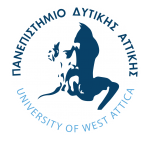Course info:
Semester: 6
General Foundation
ECTS: 6
Hours per week: 3
Professor: T.B.D.
Teaching style: Face to face, usage of specialized software
Grading: Homework / projects (60%), final written exam (40%)
| Activity | Workload |
|---|---|
| Lectures | 36 |
| Class assignments | 42 |
| Independent study | 72 |
| Course total | 150 |
Learning Results
Upon successful completion of the course, students will be able to:
- Understand the main features of reinforcement learning that distinguishes it from AI and non-interactive machine learning
- Given an application problem (e.g. from computer vision, robotics, etc), judge if it should be formulated as a RL problem, define it formally and select best-suited algorithm.
- Develop in code common RL algorithms.
- Describe multiple criteria for analyzing RL algorithms and evaluate algorithms
Skills acquired
- Data and information retrieval, analysis and synthesis
- Decision making
- Individual work
- Team work
- New research ideas generation
- Promotion of free, creative and inductive thinking
- Introduction to Reinforcement Learning
- Markov Decision Processes
- Model-free prediction
- Model-free control
- Q-learning
- Value Function Approximation
- Policy Gradient
- Actor-critic and gradient-based optimization
- Multi-agent reinforcement learning
- Deep reinforcement learning
- Reinforcement Learning: An Introduction, Sutton and Barto, 2nd Edition.
- Reinforcement Learning: State-of-the-Art, Marco Wiering and Martijn van Otterlo, Eds.
Related scientific journals:
- Artificial Intelligence
- IEEE Transactions on Artificial Intelligence
-
NeurIPS conference proceedings
- Learning Results - Skills acquired
-
Learning Results
Upon successful completion of the course, students will be able to:
- Understand the main features of reinforcement learning that distinguishes it from AI and non-interactive machine learning
- Given an application problem (e.g. from computer vision, robotics, etc), judge if it should be formulated as a RL problem, define it formally and select best-suited algorithm.
- Develop in code common RL algorithms.
- Describe multiple criteria for analyzing RL algorithms and evaluate algorithms
Skills acquired
- Data and information retrieval, analysis and synthesis
- Decision making
- Individual work
- Team work
- New research ideas generation
- Promotion of free, creative and inductive thinking
- Course content
-
- Introduction to Reinforcement Learning
- Markov Decision Processes
- Model-free prediction
- Model-free control
- Q-learning
- Value Function Approximation
- Policy Gradient
- Actor-critic and gradient-based optimization
- Multi-agent reinforcement learning
- Deep reinforcement learning
- Recommended bibliography
-
- Reinforcement Learning: An Introduction, Sutton and Barto, 2nd Edition.
- Reinforcement Learning: State-of-the-Art, Marco Wiering and Martijn van Otterlo, Eds.
Related scientific journals:
- Artificial Intelligence
- IEEE Transactions on Artificial Intelligence
-
NeurIPS conference proceedings
